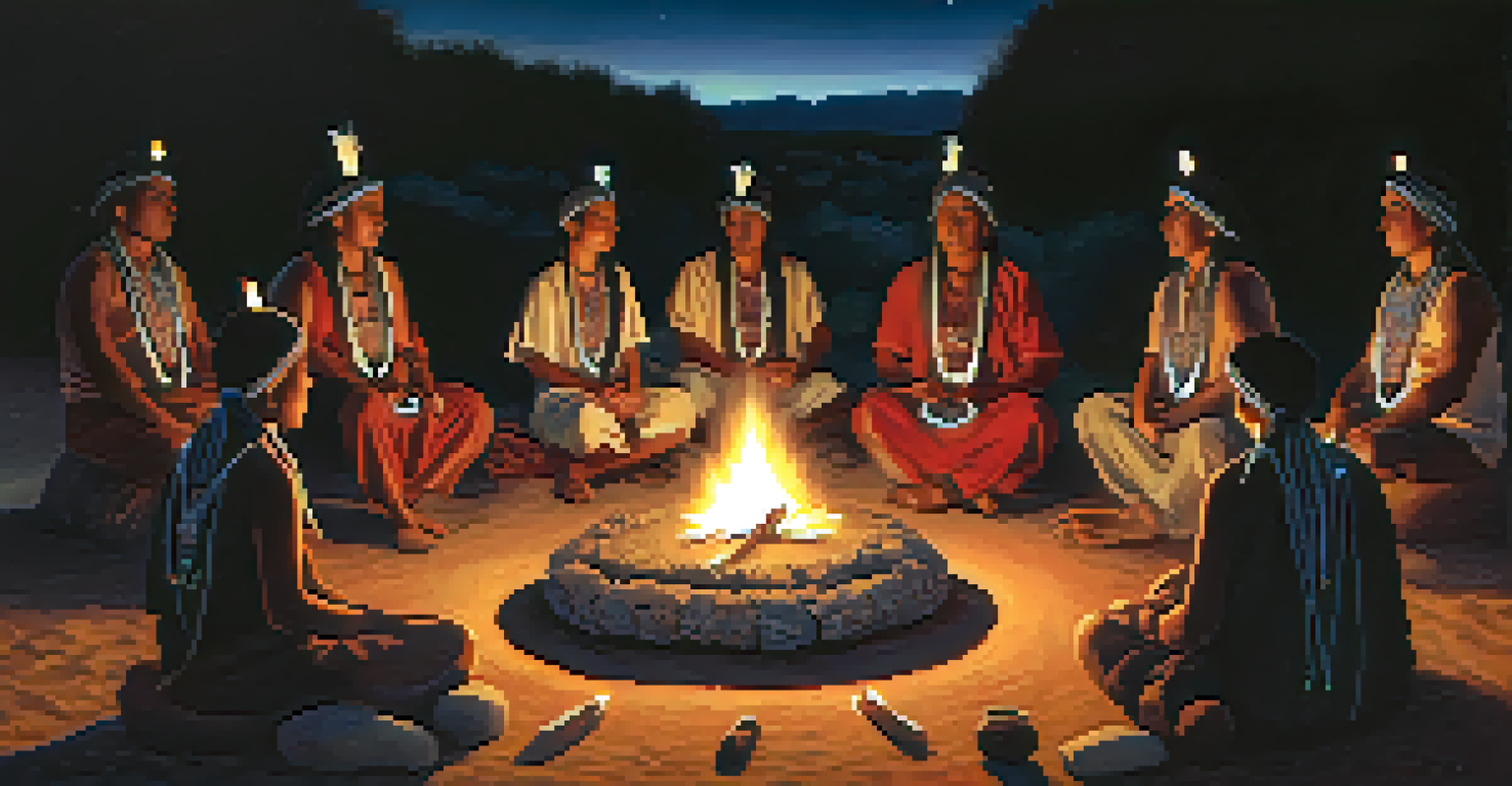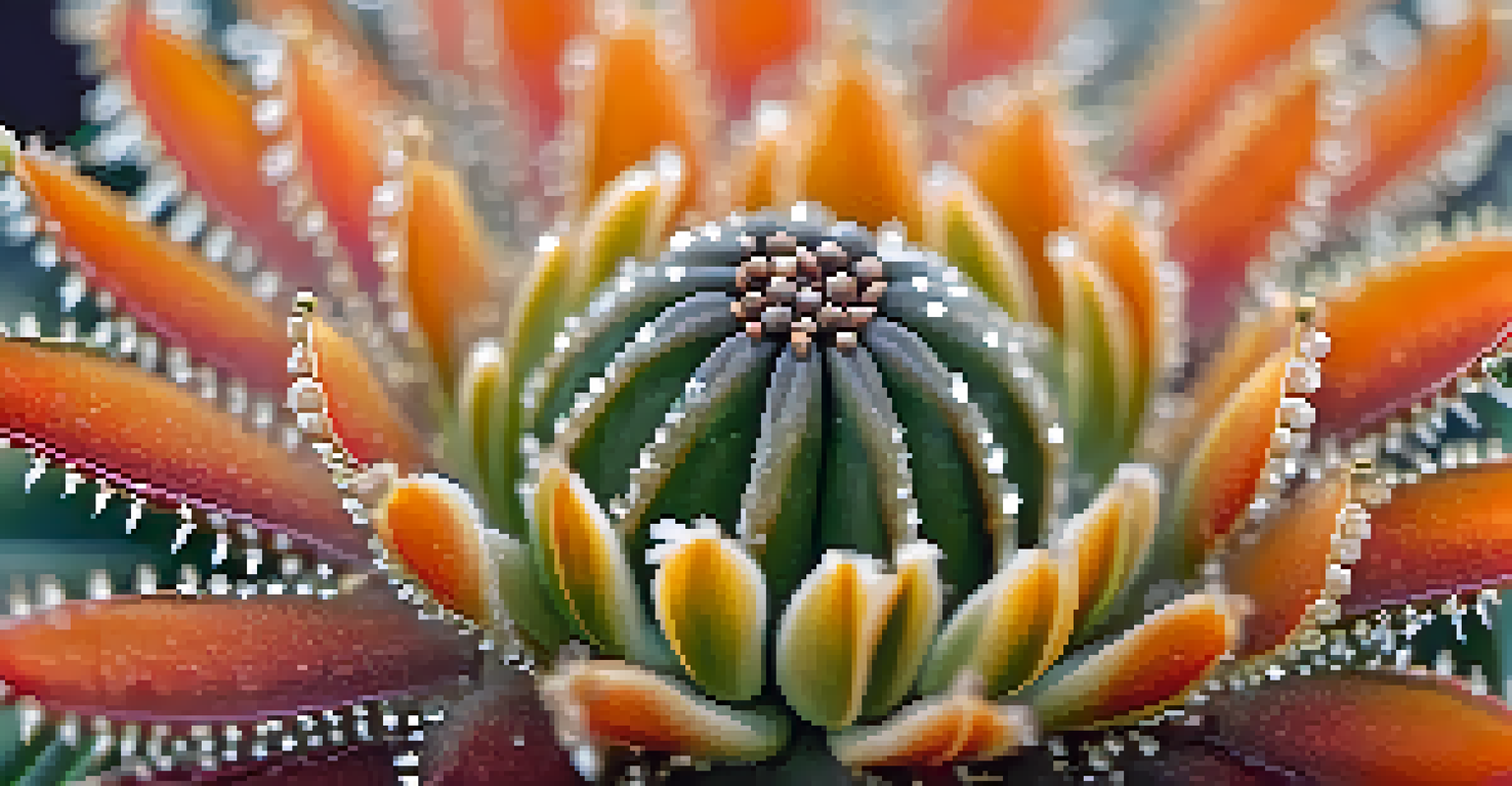Peyote: A Catalyst for Spiritual Awakening in Indigenous Cultures

Understanding Peyote: What It Is and Its Significance
Peyote is a small, spineless cactus native to the southwestern United States and Mexico. For Indigenous cultures, particularly the Native American Church, peyote is not just a plant but a sacred medicine. Its psychoactive properties are attributed to mescaline, which induces altered states of consciousness, often described as spiritual experiences.
Peyote is not just a plant but a sacred medicine.
Historically, peyote has been used for thousands of years in religious and healing rituals. For many Indigenous peoples, it serves as a bridge to connect with the spiritual realm. This connection is deeply rooted in their culture, symbolizing a path towards inner wisdom and understanding.
In these contexts, peyote is revered as a tool for personal and communal growth. It is not merely consumed for recreational purposes; rather, it's integrated into a larger spiritual practice that fosters community bonding and individual reflection.
The Role of Peyote in Indigenous Spiritual Practices
In Indigenous cultures, peyote plays a pivotal role during ceremonies and rituals. These gatherings often involve singing, drumming, and storytelling, creating an environment that enhances the peyote experience. Participants seek guidance, healing, and connection with their ancestors through these sacred gatherings.

The ceremony typically lasts all night, allowing individuals to delve into their thoughts, emotions, and spiritual questions. This process can lead to profound insights and a sense of clarity that may be difficult to achieve in everyday life. The communal aspect of these rituals reinforces social bonds and shared values among participants.
Peyote as Sacred Medicine
Peyote is revered by Indigenous cultures as a sacred medicine that facilitates spiritual experiences and personal growth.
Furthermore, these practices illustrate how peyote is intertwined with cultural identity. For many Indigenous groups, the use of peyote transcends mere ritual; it embodies a way of life, a testament to their resilience and connection to the earth.
Healing and Personal Transformation Through Peyote
Many who partake in peyote ceremonies report significant personal transformation. The insights gained during these experiences can lead to emotional healing, helping individuals confront past traumas or current challenges. This therapeutic aspect of peyote is often highlighted by participants as a vital part of their spiritual journey.
The journey with peyote is a journey towards connection—both with oneself and with the larger universe.
The experience can vary widely, from feelings of euphoria and connection to moments of deep introspection. Each person's journey is unique, shaped by their intentions and life experiences. This diversity in experiences makes peyote a powerful catalyst for personal growth.
Moreover, the healing potential of peyote is not just individual; it extends to the community. When individuals heal, they can bring that renewed energy and perspective back to their families and communities, fostering a collective spirit of resilience.
Cultural Preservation and the Future of Peyote Use
As modernization encroaches on Indigenous ways of life, the preservation of peyote traditions becomes increasingly critical. Many Indigenous leaders advocate for the continued use of peyote as a means of cultural identity and spiritual practice. Protecting this sacred plant ensures that future generations can access its benefits.
However, challenges such as illegal harvesting and habitat loss threaten the availability of peyote. Sustainable practices and education about its cultural significance are essential in combating these issues. This involves both Indigenous communities and wider society working together to honor and protect peyote.
Cultural Preservation Challenges
The preservation of peyote traditions is threatened by modernization, illegal harvesting, and habitat loss, making sustainable practices crucial.
The future of peyote use depends on respect and understanding of its cultural context. By ensuring that Indigenous voices are prioritized in discussions about peyote, we can help safeguard this integral aspect of their spirituality.
Peyote and the Broader Context of Indigenous Rights
The conversation surrounding peyote also intersects with broader issues of Indigenous rights and sovereignty. Many Indigenous groups assert that their right to use peyote as part of their spiritual practices should be protected by law. This raises important questions about cultural autonomy and the recognition of Indigenous knowledge systems.
Legal battles and advocacy efforts continue to shape the landscape of peyote use in contemporary society. Understanding these dynamics is crucial for appreciating the significance of peyote within Indigenous cultures. It highlights the importance of supporting Indigenous rights as part of a larger movement for social justice.
By recognizing the spiritual significance of peyote, we can foster greater respect for Indigenous cultures. This, in turn, can lead to more inclusive conversations about how we honor traditional practices in a modern world.
Personal Accounts: Voices of Those Who Use Peyote
Personal accounts from peyote users often provide deep insights into its transformative power. Many describe experiences of clarity, connection, and healing during ceremonies. These first-hand stories not only validate the spiritual significance of peyote but also highlight its role in personal journeys.
Individuals frequently share how peyote has helped them navigate difficult life situations or find purpose. These narratives emphasize the therapeutic aspects of peyote, reinforcing its status as a catalyst for spiritual awakening. Participants often emerge with renewed perspectives on life and their place within their communities.
Indigenous Rights and Sovereignty
The use of peyote intersects with broader issues of Indigenous rights, highlighting the need for legal protection of their spiritual practices.
Such testimonials serve as a reminder of the rich tapestry of experiences that peyote facilitates. They underscore the importance of understanding these personal journeys within the cultural framework that nurtures them.
Conclusion: The Importance of Respecting Indigenous Traditions
In conclusion, peyote is much more than a psychoactive substance; it is a sacred tool for spiritual awakening within Indigenous cultures. Its role in ceremonies, healing, and cultural identity illustrates the profound connections that exist between people, nature, and spirituality. Respecting these traditions is essential for honoring the rich histories and practices of Indigenous peoples.
As we navigate discussions around peyote and its uses, it is crucial to approach the topic with sensitivity and an open mind. Understanding the significance of peyote in its cultural context helps foster appreciation and respect for Indigenous practices. This dialogue can lead to a more inclusive society that values diverse spiritual expressions.

Ultimately, the journey with peyote is a journey towards connection—both with oneself and with the larger universe. By respecting and learning from Indigenous traditions, we can contribute to a more harmonious world that celebrates the wisdom of all cultures.